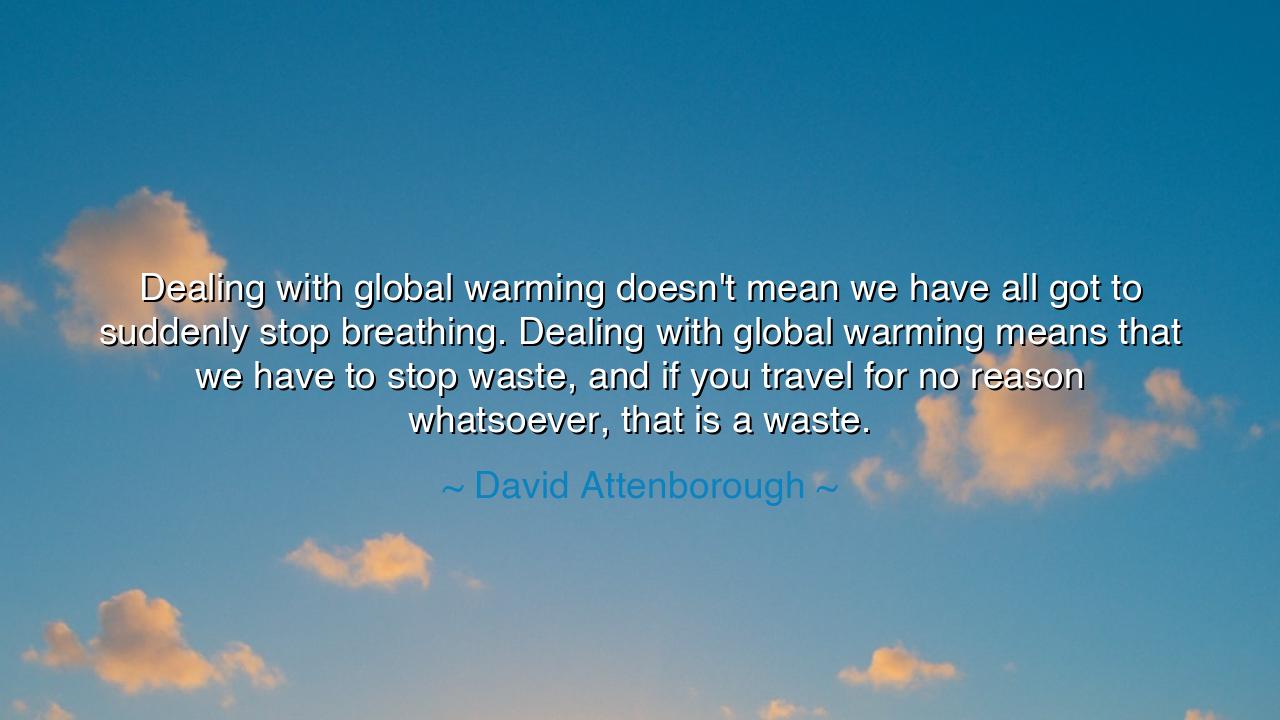
Dealing with global warming doesn't mean we have all got to
Dealing with global warming doesn't mean we have all got to suddenly stop breathing. Dealing with global warming means that we have to stop waste, and if you travel for no reason whatsoever, that is a waste.






In the words of David Attenborough, sage of the natural world and voice of the earth itself, we are given a message both urgent and hopeful: “Dealing with global warming doesn’t mean we have all got to suddenly stop breathing. Dealing with global warming means that we have to stop waste, and if you travel for no reason whatsoever, that is a waste.” These words are simple, but they strike with the force of prophecy. They remind us that the solution to humanity’s crisis is not the denial of life, but the discipline of how we live it.
To “stop breathing” is Attenborough’s way of mocking the idea that action against climate change requires us to end the very essence of life. Breath is the sign of being alive; to cease it would be to extinguish all hope. Thus he reminds us: the earth does not demand our death, but our wisdom. The call is not for despair, but for responsibility, for choosing to live in ways that sustain rather than consume.
The heart of his wisdom lies in the word waste. Waste is the great thief of the age: it devours forests, chokes rivers, fills the skies with smoke, and leaves the land barren. To waste is not only to misuse resources but to dishonor the gift of the earth. For the ancients, waste was sacrilege. The farmers of old harvested carefully, leaving seed for the next planting; the nomads of the desert took only the water they needed, knowing others would come after them. Attenborough calls us back to that reverence, to the discipline that sees waste as betrayal.
His warning about travel speaks not against discovery or human movement, but against indulgence without purpose. To journey across the world for no reason but vanity is to pour smoke into the sky for nothing gained. Yet when travel carries meaning—learning, service, the joining of distant communities—then it becomes a gift. The lesson is not to forsake the path, but to walk it wisely, with intention rather than excess.
History offers us examples of both wisdom and folly. The great caravans of the Silk Road carried goods across continents, but they also carried ideas, inventions, and cultures that enriched humanity. Their journeys were not waste but investment in human flourishing. Contrast this with the extravagance of rulers who sent fleets or armies not for necessity but for pride, draining their people and scarring the earth for empty glory. Attenborough’s words remind us to choose the first path: purposeful travel, not pointless wandering.
The urgency of global warming is real, yet his words carry hope. He does not say the problem is unsolvable, nor that we must abandon joy, art, or discovery. He says only this: stop wasting. Use with care. Choose with wisdom. This is not the cry of doom, but the counsel of a father to his children, urging them to live in balance so that they may yet inherit a world that breathes.
The lesson is clear: do not confuse living with consuming. Life is not measured by how much we take, but by how well we use what is given. To waste is to dishonor the earth and the generations yet unborn. But to live carefully, to travel with purpose, to consume only what is needed—this is the way to heal the world.
So I say to you: breathe deeply, but waste nothing. Travel if you must, but let it be with meaning. Take joy in the earth, but do not strip it bare. For the task of dealing with global warming is not to deny life, but to sanctify it—by living in reverence, in restraint, and in gratitude for the fragile beauty of our shared home.






AAdministratorAdministrator
Welcome, honored guests. Please leave a comment, we will respond soon